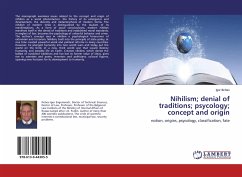The monograph examines issues related to the concept and origin of nihilism as a social phenomenon, the history of its emergence and development, the diversity and metamorphosis of modern forms. The nihilism of modern times is distinguished by the dualism of its manifestations. As a form of social consciousness, modern nihilism manifests itself in the denial of traditions and established moral standards, in neglect of law, becomes the psychology of unlawful behavior and crime. The author's concept sees in nihilism a psychological forerunner of extremism and terrorism. Nihilism, built into the principle of state policy, at one time created powerful social and political reforms in many countries. However, he plunged humanity into two world wars and today put the world on the brink of a new, third world war that would destroy humanity, and possibly life on Earth. Creative nihilism, which denies the ballast of outdated traditions and has lost its former value of ideas, gives rise to scientists and poets, inventors and politicians, cultural figures, opening new horizons for its development to humanity.








